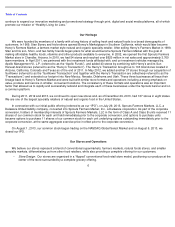Sprouts Farmers Market 2013 Annual Report Download - page 21
Download and view the complete annual report
Please find page 21 of the 2013 Sprouts Farmers Market annual report below. You can navigate through the pages in the report by either clicking on the pages listed below, or by using the keyword search tool below to find specific information within the annual report.
Table of Contents
Administration (referred to as the “FDA”), the Federal Trade Commission (referred to as the “FTC”), the U.S. Department of
Agriculture (referred to as the “USDA”), the Consumer Product Safety Commission and the Environmental Protection Agency.
Food. The FDA has comprehensive authority to regulate the safety of food and food ingredients (other than meat and poultry
products), as well as dietary supplements. Food additives and food contact substances are subject to pre-market approvals or
notification requirements. The FDA’s overall food safety authority was dramatically enhanced in 2011 with the passage of the Food
Safety Modernization Act (referred to as “FSMA”). The FSMA requires the FDA to issue regulations mandating that risk-based
preventive controls be observed by most food producers. This authority will apply to domestic food facilities and, by way of imported
food supplier verification requirements, to foreign facilities that supply food products to the U.S. market. In addition, the FSMA
requires the FDA to establish science-based minimum standards for the safe production and harvesting of produce, to identify “
high
risk” foods and “high risk”
facilities and instructs the FDA to set goals for the frequency of FDA inspections of such high risk facilities
as well as non-high risk facilities and foreign facilities from which food is imported into the United States. Though most of the
regulations and guidance for this program are being developed, the FSMA has an immediate impact.
For example, with respect to foods and dietary supplements the FSMA meaningfully augments the FDA’s ability to access
producers’ records and suppliers’ records. The FSMA gives the FDA authority to require food producers, distributors and sellers to
recall adulterated or misbranded food if the FDA determines that there is a reasonable probability that the food will cause serious
adverse health consequences to persons or animals. Additionally, the FSMA increases the FDA’s authority to institute
administrative detentions of adulterated and misbranded foods. The FSMA is also likely to result in enhanced tracking and tracing
of food requirements and, as a result, added recordkeeping burdens upon our suppliers and contract manufacturers.
The FDA also exercises broad jurisdiction over the labeling and promotion of food. Labeling is a broad concept that, under
certain circumstances, extends even to product-related claims and representations made on a company’s website or similar printed
or graphic medium. All foods, including dietary supplements, must bear labeling that provides consumers with essential information
with respect to ingredients, product weight, etc. The FDA administers a systematic review and approval program for certain
“health
claims” (claims describing the relationship between a food substance and a health or disease condition). It has also promulgated
regulatory definitions for various “nutrient content claims” ( e.g., “high in antioxidants,” “low in fat,” etc.).
FDA and USDA Enforcement. The FDA has broad authority to enforce the provisions of the Food, Drug and Cosmetic Act
(referred to as “FDCA”) applicable to the safety, labeling, manufacturing and promotion of foods and dietary supplements, including
powers to issue a public warning letter to a company, publicize information about illegal products, institute an administrative
detention of food, request or order a recall of illegal products from the market, and request the Department of Justice to initiate a
seizure action, an injunction action or a criminal prosecution in the U.S. courts. Pursuant to the FSMA, the FDA also has the power
to refuse the import of any food or dietary supplement from a foreign supplier that is not appropriately verified as in compliance with
all FDA laws and regulations. Moreover, the FDA has the authority to administratively suspend the registration of any facility
producing food, including supplements, deemed to present a reasonable probability of causing serious adverse health
consequences.
The USDA’s Food Safety Inspection Service (referred to as “FSIS”) is the public health agency responsible for ensuring that
the nation’s commercial supply of meat, poultry, and egg products is safe, wholesome, and correctly labeled and packaged. FSIS
inspectors conduct regular, mandatory on-site inspections of processing and manufacturing facilities. When violations occur, the
agency has broad
16
























